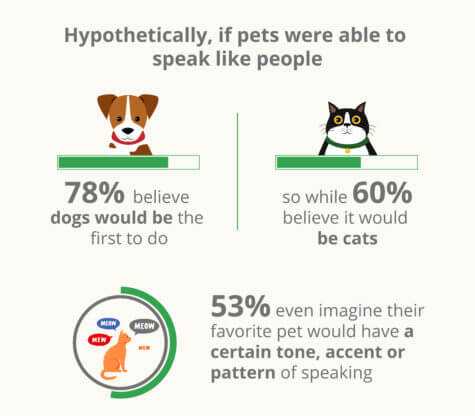NEW YORK — Almost four in five Americans believe that if animals were able to talk like people, dogs would be the first to speak up. A poll of 2,000 adults revealed that 78 percent believe that, hypothetically, dogs are more likely to start talking like a person, while 60 percent believe the same about cats.
More than half the poll (53%) imagine their favorite pet would have a certain tone, accent, or pattern of speaking.
One respondent believes her pet would have “a sassy, southern accent and the tone changes depending on what she wants or needs.” Others say “British” or “Boston” accents, while another pet owner believes, “my previous dog would have had a low, monotone voice.”
Would our pets rat us out?
Conducted by OnePoll on behalf of Healthy Paws, the survey also asked respondents about the perks and potential downsides of being able to have a conversation with our pets. Some of the benefits of pets being able to speak are that they could explain their food preferences (61%) and tell their pet parents if something is wrong (58%). For all the good chatting with our pets might bring, however, more than half (53%) are worried their pet would reveal their secrets.
On top of that, 49 percent worry they wouldn’t stop talking and 46 percent are concerned they’d insult someone. In general, respondents believe dogs are more likely to say something mean than cats (33% vs 24%), but another third believe they are equally likely to say something callous.
If pets did start speaking, 22 percent would record it and 17 percent would scream or panic. Just 15 percent would simply talk right back.
“It’s fun to speculate on what our pets might say and how they would sound,” says Danette Johnston, a consulting dog trainer at Healthy Paws and owner of Dogs Day Out training center in Seattle, in a statement. “But the important thing is to understand our pets are communicating with us all the time with their body language and vocalizations and it is up to us to learn their language.”

Pet owners still communicate without speaking
Respondents already feel pretty confident they can understand meows and barks, as 23 percent claim they “always” understand what a pet is trying to say and 42 percent “often” understand. Owners look for indicators like “talking” or making noises (61%), “following me around” (54%), and whining (53%). However, it takes time for people to understand their pets, as the average respondent needs about three-and-a-half years to fully understand how they communicate.
Half of respondents have worried that they’ll miss an injury or illness because pets can’t speak to us. But respondents look for ways to tell if their pet isn’t feeling well like lack of appetite (52%), restlessness (51%), and fatigue (50%).
Overall, 82 percent of respondents agree that those who consistently have pets have a better understanding of them.
“While pets may not be able to speak with us verbally, it’s up to us as pet parents to learn when they are trying to tell us something important,” says Rob Jackson, founder and chief pet protector for Healthy Paws Pet Insurance. “Look for signs your pet isn’t feeling well, such as lethargy, lack of appetite, trouble passing stool, diarrhea, vomiting, or limping. If any of these conditions persist for more than a few hours, get them to a veterinarian to resolve any issues before they worsen. And, of course, regular vet visits are always recommended to track your pet’s general health and to keep them up-to-date on vaccines or other preventatives.”
Survey methodology
This random double-opt-in survey of 2,007 U.S. general population was commissioned by Healthy Paws between Aug. 11 and Aug. 19, 2022. It was conducted by market research company OnePoll, whose team members are members of the Market Research Society and have corporate membership to the American Association for Public Opinion Research (AAPOR) and the European Society for Opinion and Marketing Research (ESOMAR).
